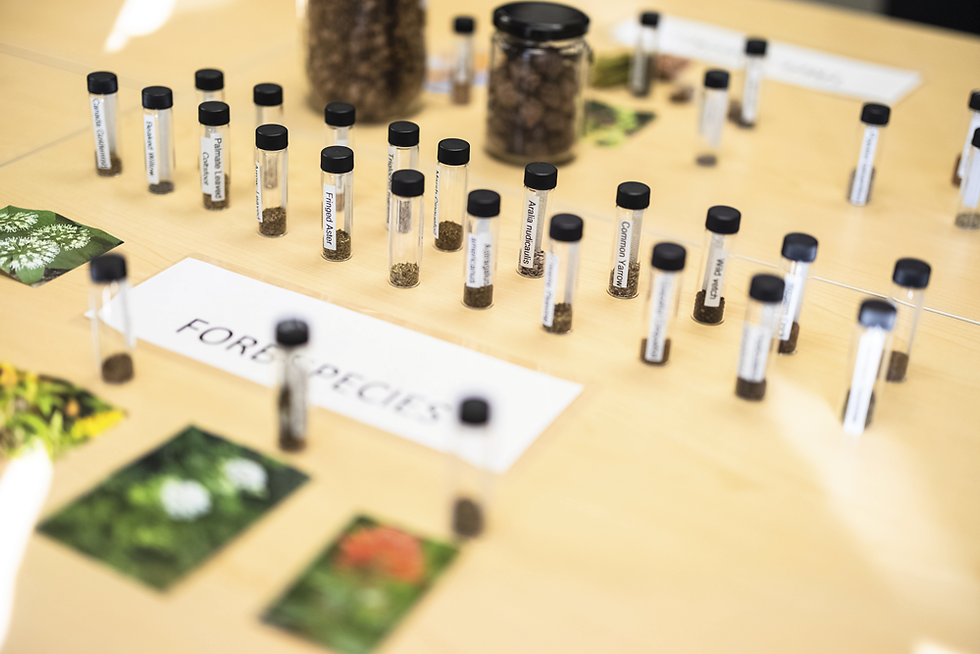10-Year Investment Expands on Long-standing Applied Research Partnership

Innovative forest reclamation research led by NAIT applied researchers has received a 10-year, $1.5 million boost thanks to an investment from long-standing industry partner ConocoPhillips Canada.
The funding will support the ongoing efforts of researchers at NAIT’s Centre for Boreal Research in Peace River investigating improved methods for boreal forest reclamation following industrial activities such as oil and gas development. The work began nearly a decade ago thanks to a previous investment from ConocoPhillips Canada.
Led by Dr. Amanda Schoonmaker, NAIT’s NSERC Industrial Research Chair for Colleges in Boreal Reclamation and Reforestation, the research team will continue to advance various site preparation and revegetation techniques to improve forest reclamation outcomes at ConocoPhillips Canada’s Surmont oilsands site, roughly 56 km south of Fort McMurray.

The ongoing partnership is also expanding beyond ConocoPhillips Canada’s Surmont site into new areas, including the Montney field in Northeast BC.
According to Dr. Schoonmaker, one of the approaches, cluster planting—where trees are densely planted in groups rather than uniformly spaced—has shown great promise.
“This technique encourages faster canopy closure, mimicking natural forest regeneration patterns and promoting the restoration of forested habitat in just five to 10 years—significantly faster than conventional methods, which may take decades to close forest canopy,” said Dr. Schoonmaker.
Dr. Schoonmaker and team will continue a study to explore alternative methods for topsoil management. Instead of the conventional practice of hydroseeding topsoil stockpiles with grasses, the team experimented with planting a variety of boreal trees and shrubs that mimic a forest landscape. This approach maintains soil integrity, creates forest canopy cover and discourages the growth of undesired weeds. The result is more successful restoration once the stockpiled soil is replaced.

Another area of focus is weed management. Schoonmaker’s team aims to demonstrate that in some cases, minimal intervention—allowing natural processes and competition to occur—may be an alternative strategy to conventional weed control.
“The Boreal Forest Reclamation project has allowed us to experiment and try different techniques that challenge the status quo of reclamation practices,” said Robert Albricht, Environmental Operations Supervisor, ConocoPhillips Canada. “We continue to improve our practices and apply them to our work.”
Dr. Schoonmaker adds that the research partnership is also creating knowledge that can be shared.
“Seeing this research out long-term is not only valuable to me as a researcher, but it also allows NAIT to better train student and early-career researchers who come to us from all over Canada [and] can see firsthand reclamation research methods coming to fruition in an industrial setting,” said Dr. Schoonmaker.

What’s more, results and methods can be shared with other industries that are committed to boreal forest and land reclamation.
NAIT and ConocoPhillips Canada are excited to continue their partnership.
“Our partnership with NAIT has been instrumental in driving innovation and excellence in our reclamation efforts,” said Albricht. “Investing in boreal forest reclamation research is important to ensure we understand the factors that lead to success, expand our reclamation toolkit and enhance the reliability and effectiveness of our reclamation work.”
To honour the relationship, NAIT has renamed the greenhouse at the Centre for Boreal Research in Peace River the ConocoPhillips Canada Greenhouse. The organizations celebrated the funding announcement and renaming at an event at NAIT’s Centre for Boreal Research, located on Northern Lakes College’s Peace River Campus, on October 11.
Photography by Stewart Burnett, Town of Peace RIver

Comments